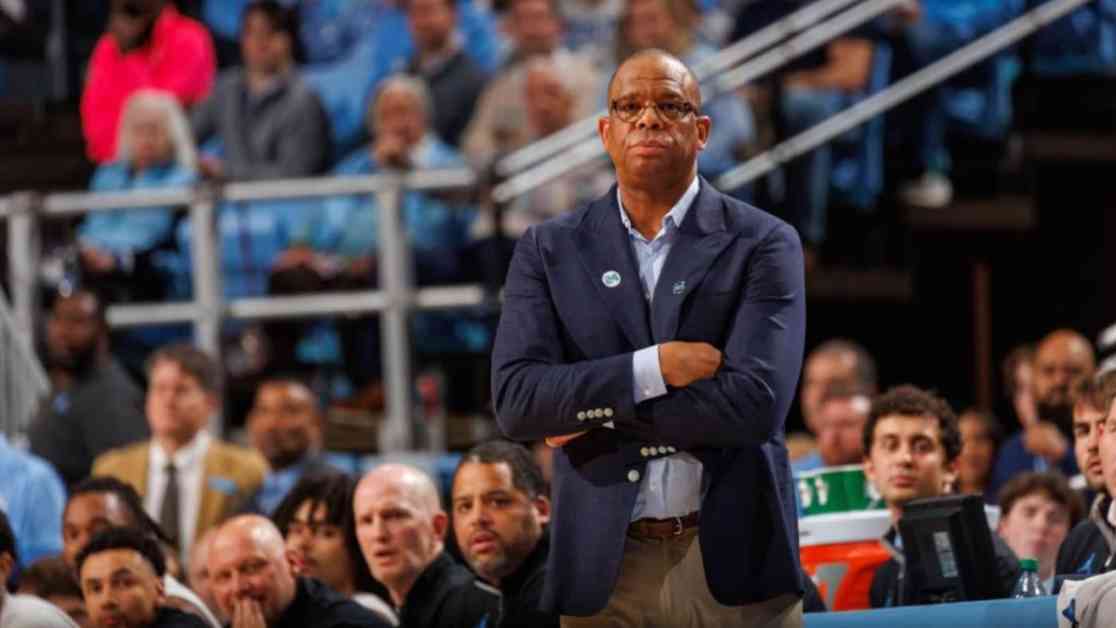North Carolina basketball coach Hubert Davis made a groundbreaking announcement recently, signaling a major shift in the Tar Heels program. During a recent episode of “Hubert Davis Live,” Davis hinted at the hiring of a general manager, a move that could potentially reshape the team’s structure and operations. This news comes at a crucial time for the Tar Heels, who are facing mounting pressure from fans following a disappointing loss to Duke and a shaky season record.
Davis emphasized the need for additional support staff to navigate the complexities of modern college basketball. In his own words, he expressed surprise at the necessity of a general manager, highlighting the myriad responsibilities that can detract from the core focus of coaching. This strategic shift reflects a broader trend in college athletics, where the landscape is evolving rapidly with the introduction of new challenges like Name, Image, and Likeness (NIL) regulations, the transfer portal, and the increasing presence of international players.
The idea of incorporating a general manager into the coaching staff is a departure from traditional models in college sports. While general managers in professional sports often have significant decision-making power, their counterparts in college settings typically work under the guidance of the head coach. However, as Davis pointed out, the demands of modern college basketball require a more expansive support system to address the diverse needs of the program.
### Challenges and Opportunities in Roster Management
One key area of concern for the Tar Heels is the composition of their roster for the upcoming season. With the departure of star center Armando Bacot, UNC is facing a void in the paint that has impacted their performance on the court. The team’s reliance on guards for rebounding highlights a glaring deficiency in size and interior presence, ranking them at the bottom of the ACC in average height.
Despite these challenges, there are bright spots on the horizon for UNC’s future. Freshmen Ian Jackson and Drake Powell have shown immense potential, drawing attention as potential first-round NBA Draft picks. However, the team’s transfer acquisitions have not yielded the expected results, with players like Cade Tyson and Ven-Allen Lubin failing to make a significant impact on the court. This disparity underscores the need for a more comprehensive approach to roster management and player development.
### Adapting to a Changing Landscape
As college basketball continues to evolve, programs like North Carolina must adapt to stay competitive. The traditional model of coaching and recruitment is no longer sufficient in the face of shifting trends and regulations. By integrating a general manager into the team structure, the Tar Heels are positioning themselves to navigate the complexities of modern college athletics more effectively.
Davis’s decision to revamp the program reflects a proactive approach to addressing the challenges of today’s basketball landscape. By acknowledging the need for additional support and expertise, he is setting the stage for a new era of Tar Heels basketball that is better equipped to thrive in a dynamic and competitive environment. As the team looks ahead to future seasons, the role of the general manager will play a crucial part in shaping UNC’s trajectory and success on the court.
In conclusion, North Carolina’s decision to introduce a general manager marks a significant turning point for the program. By recognizing the need for enhanced support and strategic planning, the Tar Heels are taking a bold step towards securing their position as a powerhouse in college basketball. As the team navigates the challenges and opportunities that lie ahead, the addition of a general manager promises to usher in a new chapter of growth and success for UNC basketball.








